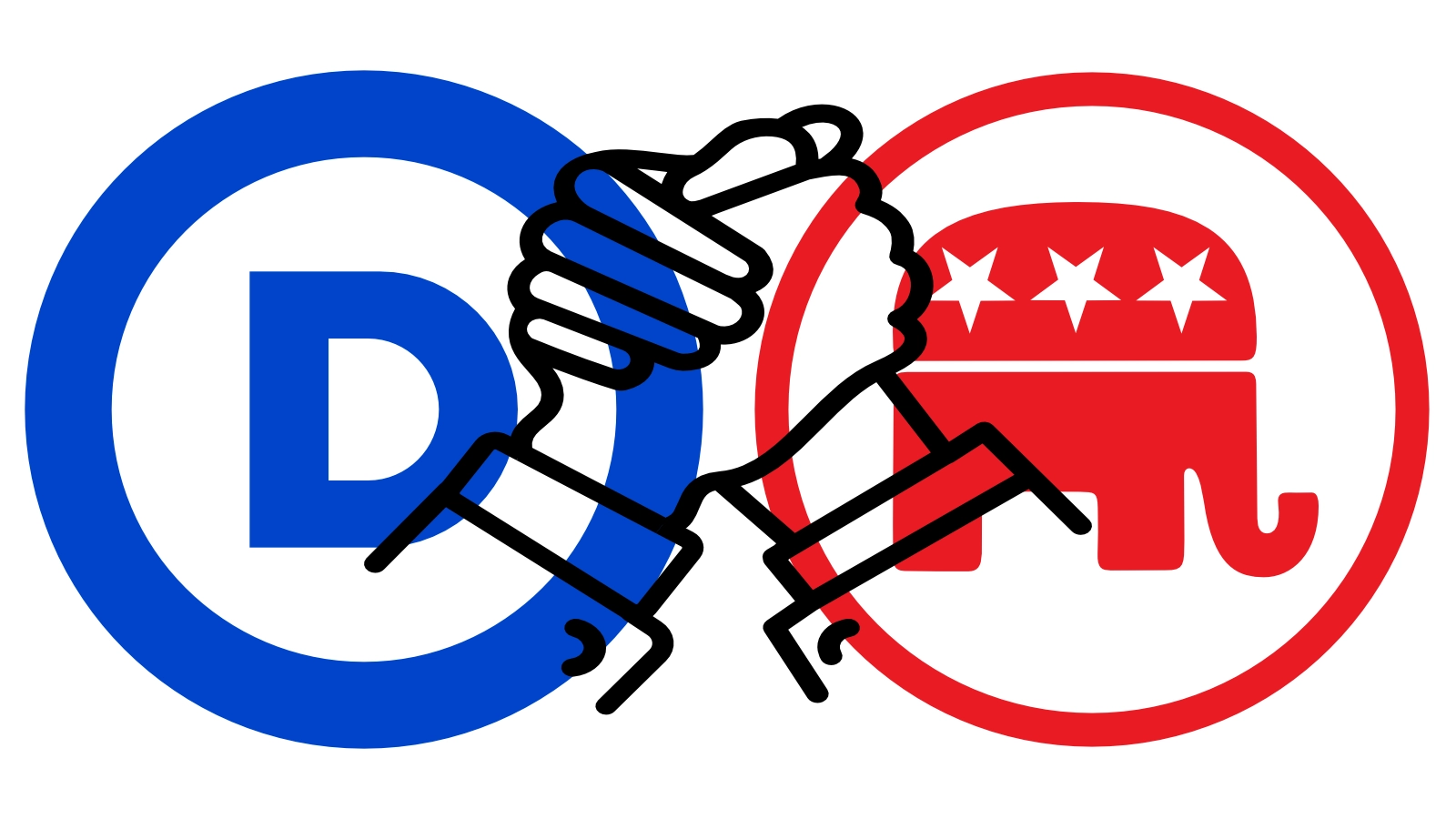From a European point of view
Disclaimer: These are my personal views as a random person, not a political expert. I dislike the traditional left/right political spectrum, as it oversimplifies the complexities of modern politics. Many ideas considered left can overlap with those on the right, and populism exists on both sides. I prefer to think in terms of people’s choice versus authoritarianism, as both the left and right have had their share of dictatorships in the world.
I’ve been following the US elections by watching CNN (which leans towards the Democrats) and Fox News (which favours the Republicans), as well as parts of both party conventions.
Why am I even interested?
The United States is the most powerful nation in the world, and its decisions, such as those involving NATO, allyship in conflicts, or the Paris Agreement, affect the entire globe. As with every election cycle, I find myself curious and a little anxious about the outcome. Of course, the choice is up to American citizens and my article is purely theoretical.
First of all, I try not to judge the candidates on personality, whether they are likeable, who I’d prefer to be friends with, or who seems more “decent”, though compassion does matter.
What some people fail to understand
Economic policies often take years to bear fruit. For instance, those who claim their lives improved economically under Trump may actually have benefited from Obama-era policies. Similarly, some of the economic challenges faced since 2021 could be the aftershocks of Trump’s policies.
Moreover, Trump, Obama, Biden, or Harris are not to be blamed for the global pandemic and subsequent economic crisis. These problems were global and the economic consequences were unfortunately inevitable. What matters is how leaders respond to such crises.
In 2020, Trump had discarded a well-organised blueprint playbook for pandemic response (designed during Obama administration for future threats, after episodes like flu variants, Zika, Ebola, SARS outbreaks), and the country’s response to COVID-19 was slow. During a pandemic, in a country where misinformation runs rampant, belittling science and medical experts was especially harmful.
On the other hand, the Biden administration’s efforts to mitigate the economic fallout seem to have helped, as the US economy is faring better than it might otherwise have done.
What I dislike about the campaigns
Harris/Walz
- Over-the-top patriotism, such as claims of being “the best nation in the world” or recovering “better than any other country.” Ask people in Denmark, Sweden, or Spain about their quality of life compared to the US! But maybe it’s necessary to say such things to win an election…
- While Harris’s policies might appear centrist, especially regarding immigration, it’s a stance that likely reflects what the American electorate desires. Her bipartisan approach sought middle ground but, for me, it remains too strict, thus listed here. It’s ironic, then, that some accuse her of “opening the borders.”
- “I’ll sign into law” declarations, there’s a tendency to overestimate what a President can accomplish when/if the opposing party holds Congress.
Trump/Vance
- Trump’s statement, “Vote for me this time and you won’t have to vote again,” veers dangerously towards authoritarianism. Ending elections is the very definition of totalitarianism, even if he later claimed it was directed only at Christian voters.
- Still not accepting he lost in 2020 and past attempts to overturn a fair election.
- Racism, divisive rhetoric, and inflammatory comments towards opponents have led to violence. Inciting violence ended up with two assassination attempts on himself.
- Misleading claims about non-citizens voting or crimes committed by immigrants only fuel division.
- The idea that tariffs on imports are paid by exporting countries is fundamentally flawed. Similarly, in 2016, he claimed that Mexico was going to pay for the wall…
Tariffs lead to higher costs for consumers, either through increased prices or reduced availability. It’s unclear whether Trump doesn’t grasp basic economics and international relationships or whether he’s exploiting his followers’ ignorance. - The intertwining of religion and politics, with the aim of transforming democracy into a theocracy, is deeply concerning. Many religious Americans have been misled into abandoning their own values.
- Project 2025 is a frightening far-right programme that Trump claims not to know much about, yet it has been devised by people in his inner circle. It recalls some of the more disturbing ideologies of the 1930s and ’40s. Be warned, if you read it, you may find it deeply unsettling.
On immigration
Contrary to what some Americans seem to believe, the whole world does not want to move to the USA. It’s a myth similar to those peddled by European right-wing parties, who claim that the entire continent of Africa wants to migrate to Europe. The reality is quite different.
In fact, some of my American friends have chosen to move to Portugal or Spain and have no desire to return to the US.
Most people want to remain in their own countries, close to their roots, culture, and families. People typically migrate when their basic needs – safety, food, water, education, healthcare, and a basic income – are not met. Supporting peace seeking policies and the growth of those countries can reduce the need for migration.
I find terms like “third world” or “aliens” demeaning and outdated. To hear a candidate’s running mate claim that “immigrants bring third world conditions to the US” is deeply offensive. Immigrants are often just ordinary people seeking a decent life for their families.
Immigration, and this is valid anywhere in the world, doesn’t inherently damage an economy, as long as people are allowed to work. An influx of 20,000 people also creates demand for housing, infrastructure, goods, and services, which in turn generates jobs and stimulates economic growth. There is no difference whether they hold citizenship or not. The challenge is managing the speed of arrivals and the adaptation of existing infrastructures.
And remember, history has shown that power shifts and empires fall. One day, American citizens might need to migrate south. Wouldn’t they want to be welcomed? Climate change could force such migration, and other nations may soon surpass the US in global influence. The growing economies in Asia and Africa are proof that the balance of power is shifting. And this is good, balance of power is the key.
On reproductive rights
The overturning of Roe v. Wade has put many lives at risk. Women have been denied care (as health personnel was concerned about performing medical procedures that had become illegal), even during miscarriages, and some victims of rape and incest are being forced to carry their attacker’s child. It’s horrifying.
For those who oppose abortion for religious reasons of saving lives, the reality is that when abortion is illegal, women often seek dangerous alternatives. This only increases the number of deaths, with self-induced or “back-alley” abortions (you said saving lives?). No woman undergoes an abortion lightly, and the decision is never without emotional weight.
Ironically, the same people who oppose abortion also oppose sex education in schools, which could help reduce the need for abortions in the first place. It’s a regression to past centuries, in a country that claims to be the most advanced in the world.
Calling Harris a communist/marxist? hahaha
Harris’s policies seem far more centrist. To me, they resemble where the Republican Party stood during the Reagan or both Bush eras. Meanwhile, today’s Republican Party, particularly Trump’s supporters, has moved far to the right.
If you’re unsure, check out the definitions of communism and Marxism. These terms refer to systems where private property, social classes, and even money and the state are abolished. Harris’s support for small businesses and employment hardly makes her a communist!
Why a polical campaign has to be filled with hate and lies?
Both sides make false claims about their opponents, and even when those claims are true, the relentless bashing is exhausting.
I recently watched an insightful video by Veritasium (a science/mathematic channel by Derek Muller) on the causes and effects of bipartisan systems. At 5’30” it shows how the “Instant runoff” system works. It includes an interesting example of a mayoral election in Minneapolis in 2013, where 35 candidates competed in a very civilised race, thanks to an “instant runoff” system (with guest Latif Nasser from Radiolab, and their episode mentioning that story).
Register to vote?
It’s baffling that US citizens aren’t automatically registered to vote. Surely the government already has records of adult citizens? This system leads to many voices going unheard.
Comparison to other systems
While no system is perfect, and we don’t go around claiming “We’re the best in the world!”, it’s worth considering some alternatives.
Switzerland
Read the dedicated blog post: The Swiss Federal Council: A Unique Model of Shared Leadership
Switzerland’s Federal Council represents the executive branch. Rather than having a single president, we have a council of seven members from across the political spectrum, elected by the Federal Assembly (which functions like two parliamentary houses). This system avoids the fierce presidential election campaigns and the vast sums of money spent on ads that we see in the US.
Crucially, the real power lies with the people, thanks to our system of direct democracy. Any Swiss citizen can propose constitutional amendments, provided they gather enough signatures. These proposals are then put to a vote. For each election or referendum, every citizen automatically receives their ballot by post at their registered address. It’s an effective system that values participation and consensus. You can find more information on the federal administration site.
The Nordic model
Why do Finland, Sweden, Denmark, and Norway consistently rank so highly in global Happiness Index? Perhaps it’s because people there enjoy a good standard of living, with little concern for healthcare costs and generally stable economies. The Nordic model is part of what’s known as “social corporatism” and is based on a mixed economy. While it includes elements of socialism (a word often misunderstood by US Americans), it also embraces private ownership and market principles.
Wikipedia on Nordic model: “based on the economic foundations of social corporatism, and a commitment to private ownership within a market-based mixed economy”.
Under this model, the government plays a role in ensuring citizens’ welfare, but within a framework that supports private enterprise. This balance between a strong welfare state and a market economy seems to work well for their populations, which live relatively worry-free lives compared to many in the US.
In short …
Ultimately, no system is without its flaws. However, both Switzerland and the Nordic countries provide examples of political structures that foster stability, fairness, and public welfare. They focus on empowering citizens and ensuring that the system works for everyone, rather than just those at the top.
More
I might amend this post later with more examples.
To be continued
First published on 5 October, I might edit this post until the US election.
Related posts
These opinions and texts are mine, with the assistance of ChatGPT solely to improve the quality of the English language.



Leave a Reply